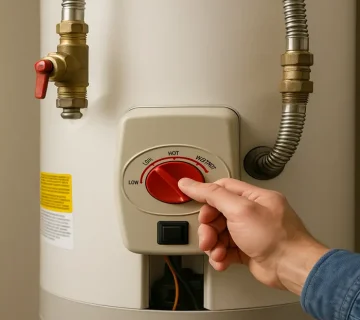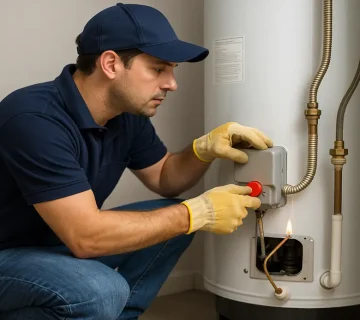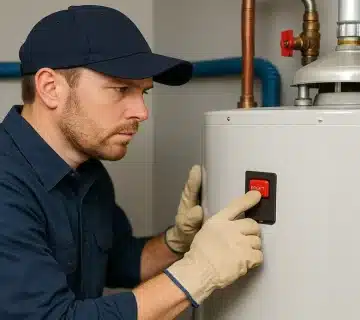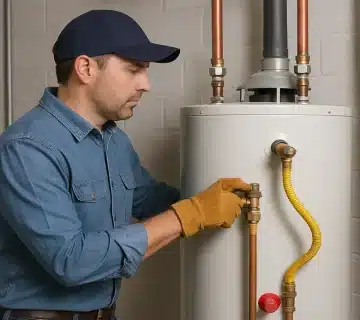Your water heater is one of the most important appliances in your home. It keeps showers warm, dishes clean, and laundry fresh. But eventually, every homeowner asks the question: how long does a water heater last? The answer depends on the type of system, the quality of your water, and how well you maintain it.
In this guide, we’ll share 7 amazing facts about how long does a water heater last?, what affects them, and how you can extend the life of your system.
Average Lifespan of a Water Heater
- Tank Water Heaters
- Gas models: 8–12 years.
- Electric models: 10–15 years.
- Tankless Water Heaters
- Often last 20 years or more with proper maintenance.
In general, if your water heater is over a decade old, it’s wise to monitor it closely and start planning for a replacement.
7 Amazing Facts That Affect Lifespan
- Type of Heater
- Tank models are constantly heating and storing water, which puts more stress on the system. Tankless models only heat water when needed, so they face less wear and last longer.
- Water Quality
- Hard water accelerates sediment buildup inside the tank. This not only reduces efficiency but can also cause pipes to clog and heating elements to fail sooner. Installing a water softener or whole-house filter can add years to your heater’s life.
- Maintenance Routine
- Draining and flushing once a year keeps sediment from settling. Checking the anode rod every 3–5 years and replacing it when worn down prevents corrosion inside the tank. For official guidance, see this water heater maintenance.
- Usage & Demand
- A household of five people using multiple showers, dishwashers, and laundry cycles each day will wear down a heater faster than a single person or couple. The more often the heater cycles, the shorter its lifespan.
- Installation Quality
- Professional installation ensures the heater is the right size, properly vented, and safely connected. Poor installation can cut years off your unit’s life.
- Temperature Settings
- Setting the thermostat around 120°F (49°C) reduces stress on the system, prevents scalding, and saves energy. Higher settings make the heater work harder and fail sooner.
- Brand & Build Quality
- High-quality models with stronger linings and reliable parts generally outlast cheaper, low-end heaters.
Signs You May Need a New Water Heater
Even before the end of its typical lifespan, your unit might show warning signs:
- Hot water runs out too quickly.
- Rusty or metallic-tasting water.
- Puddles or leaks near the tank.
- Loud banging, rumbling, or popping noises.
- Frequent repairs that cost more than half the price of a new heater.
If you’re asking yourself “how long does a water heater last?” and you notice these symptoms, it may be time to replace your unit.
If these issues sound familiar, you may already be seeing important signs to replace your water heater
How to Extend the Life of Your Water Heater
- Flush the tank annually to remove sediment.
- Check the anode rod and replace it if corroded.
- Insulate pipes and the tank to reduce heat loss.
- Set the temperature properly to minimize wear.
- Schedule professional inspections every couple of years.
In addition to draining, you should also learn how to flush a water heater to keep sediment from damaging your tank.
Tank vs. Tankless: Which Lasts Longer?
- Tank heaters: Less expensive upfront, but they usually last 8–15 years. Over 20 years, you may end up replacing them more than once.
- Tankless heaters: Higher initial investment, but they often last 20+ years and provide unlimited hot water. They also save energy since they only heat water on demand.
If you plan to stay in your home long-term, a tankless model may be the smarter investment despite the higher upfront cost.
FAQ: How Long Does a Water Heater Last?
Q: Can I make my heater last longer than average?
Yes. With annual flushing, anode rod replacement, and water treatment, many heaters exceed their expected lifespan.
Q: Does location matter for lifespan?
Absolutely. Heaters placed in garages, basements, or uninsulated spaces may wear out faster due to humidity or extreme temperatures. Installing your heater in a climate-controlled space can extend its life.
Q: Should I replace before it fails?
Yes. Waiting until it bursts can cause costly water damage. If your tank is 12+ years old, consider replacing it proactively.
Final Thoughts
So, how long does a water heater last? On average, 8–15 years for tank models and 20+ years for tankless units. With proper care, you can extend your heater’s life, lower energy costs, and avoid the stress of cold showers.
By paying attention to warning signs, performing regular maintenance, and making smart upgrade decisions, you’ll enjoy reliable hot water and peace of mind for years to come.
If you’re still asking how long does a water heater last, don’t miss these proven tips to extend your water heater’s lifespan.





